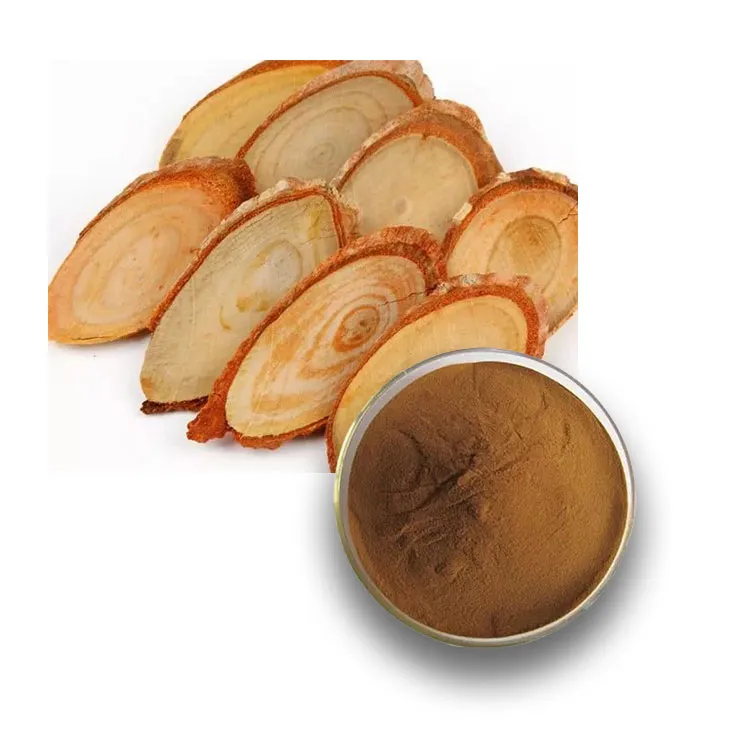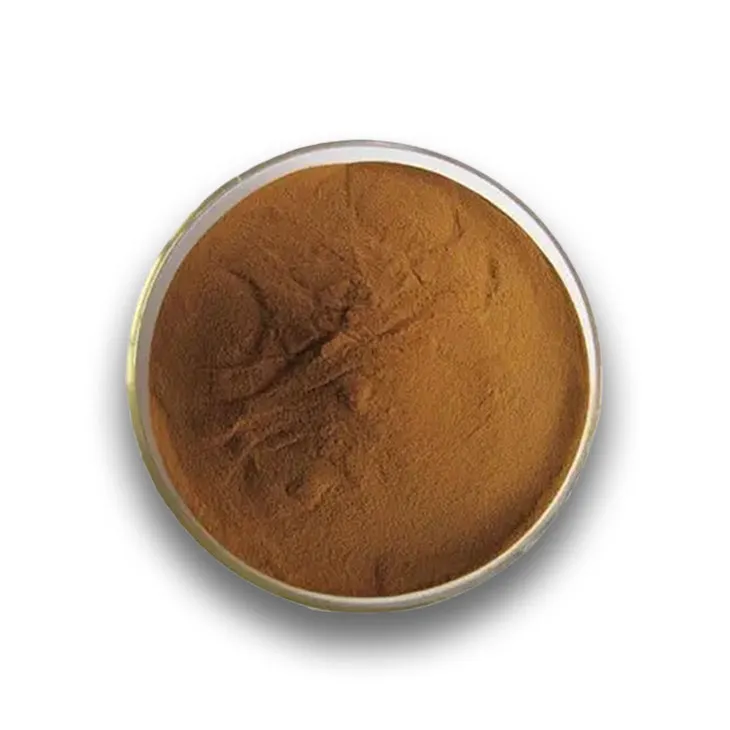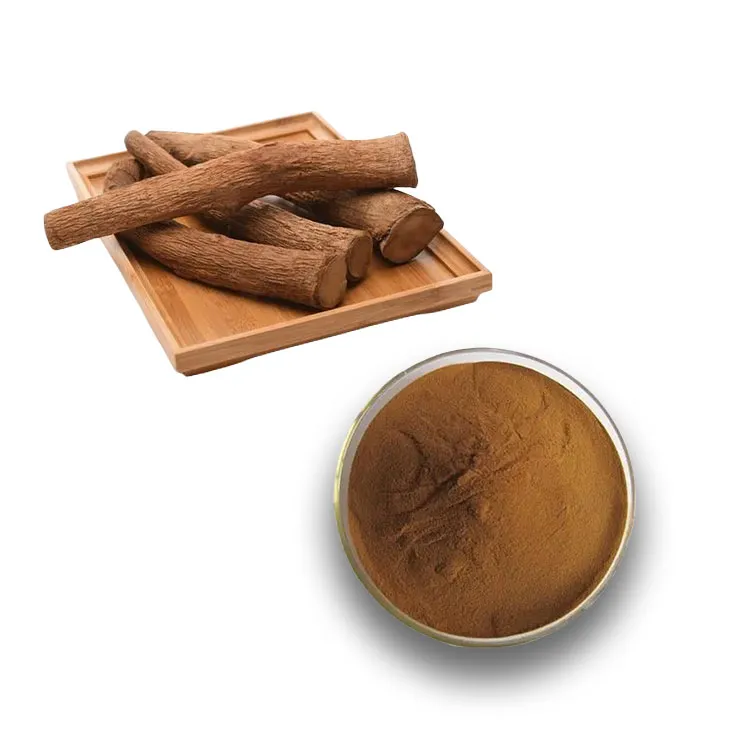- 0086-571-85302990
- sales@greenskybio.com
Organic Tongkat Ali extract powder factory.
2024-11-26

Introduction to Tongkat Ali and its Significance
Tongkat Ali, also known as Eurycoma longifolia, is a plant native to Southeast Asia. It has been used in traditional medicine for centuries due to its potential health - enhancing properties. Organic Tongkat Ali Extract powder has gained popularity in recent years as a natural supplement, which is where the Organic Tongkat Ali Extract powder factory comes into play.

The Role of the Factory in the Supply Chain
The factory is a crucial link in the natural supplement supply chain. It takes the raw Tongkat Ali as the starting material and converts it into a more refined and concentrated form - the extract powder. This process is essential as it makes the beneficial components of Tongkat Ali more accessible and easier to use in various products such as dietary supplements, functional foods, and herbal remedies.

Production Process
Raw Material Selection
The first step in the production process is the careful selection of raw Tongkat Ali. Only high - quality, organically - grown Tongkat Ali is chosen. This ensures that the final extract powder is free from pesticides, herbicides, and other harmful contaminants. The selection process may involve visual inspection, as well as testing for purity and origin.
Extraction with State - of - the - Art Equipment
Once the raw material is selected, the extraction process begins. The factory uses state - of - the - art equipment for this purpose. This equipment is designed to effectively isolate the beneficial components from the Tongkat Ali plant. Different extraction methods may be used, such as solvent extraction or supercritical fluid extraction. Solvent extraction involves using a suitable solvent to dissolve the active compounds, while supercritical fluid extraction uses a fluid that is above its critical temperature and pressure to extract the components. These methods are carefully controlled to ensure the highest quality of the extract.
Purification and Concentration
After the extraction, the resulting liquid extract needs to be purified and concentrated. This step involves removing any impurities, such as residual solvents or unwanted plant materials. Filtration and chromatography techniques are often used for purification. Concentration is then carried out to increase the potency of the extract. This results in a more concentrated form of the Tongkat Ali Extract powder.
Drying and Powdering
The final step in the production process is drying and powdering the concentrated extract. Drying can be done using methods such as spray drying or freeze - drying. Spray drying involves spraying the liquid extract into a hot air stream, which quickly evaporates the moisture and forms a powder. Freeze - drying, on the other hand, involves freezing the extract and then removing the ice by sublimation. Once dried, the extract is milled into a fine powder, which is the final product - the Organic Tongkat Ali Extract Powder.

Quality Assurance
Quality assurance is of paramount importance in the Organic Tongkat Ali Extract Powder factory. Every batch of the extract powder undergoes rigorous testing for safety and efficacy.
Safety Testing
For safety testing, the extract powder is tested for the presence of contaminants such as heavy metals (e.g., lead, mercury, cadmium), pesticides, and microbiological contaminants (e.g., bacteria, fungi, yeasts). These tests are carried out using advanced analytical techniques such as atomic absorption spectroscopy for heavy metals and high - performance liquid chromatography for pesticide residues. Microbiological testing is done using standard culture methods to ensure that the product is free from harmful microorganisms.
Efficacy Testing
Efficacy testing is focused on determining whether the extract powder contains the expected active components and whether these components have the claimed health benefits. This may involve testing for specific compounds such as eurycomanone, which is one of the key bioactive components in Tongkat Ali. In - vitro and in - vivo studies may be conducted to evaluate the biological activity of the extract, such as its antioxidant, anti - inflammatory, or testosterone - enhancing properties.
Research and Development
The factory also places a strong emphasis on research and development (R & D). Continuous R & D efforts are carried out to explore new applications and improve the production process.
New Applications
Researchers in the factory are constantly looking for new ways to use Tongkat Ali Extract Powder. For example, they may be exploring its potential use in the cosmetic industry for skin health or in the sports nutrition industry for enhancing athletic performance. New product formulations are being developed, such as combining Tongkat Ali extract powder with other natural ingredients to create more effective and multi - functional supplements.
Production Process Improvement
In addition to finding new applications, the R & D team is also focused on improving the production process. This includes optimizing the extraction methods to increase the yield and purity of the extract. They may also be looking into ways to reduce the cost of production without sacrificing quality. New equipment and technologies are being evaluated and adopted to make the production process more efficient and sustainable.
Environmental Protection
The Organic Tongkat Ali extract powder factory has a positive impact on environmental protection. It promotes the sustainable use of Tongkat Ali resources.
Sustainable Sourcing
The factory ensures that the Tongkat Ali it uses is sourced sustainably. This means that it works with local farmers or suppliers who follow sustainable farming practices. These practices may include proper land management, water conservation, and the use of natural fertilizers and pesticides. By promoting sustainable sourcing, the factory helps to protect the natural habitat of Tongkat Ali and ensure its long - term availability.
Waste Management
During the production process, the factory also pays attention to waste management. It aims to minimize waste generation and recycle or dispose of waste in an environmentally - friendly manner. For example, any residual plant materials from the extraction process may be composted and used as fertilizer, and waste solvents may be recycled or properly disposed of to prevent environmental pollution.
Conclusion
The Organic Tongkat Ali extract powder factory is an important and multi - faceted entity. It not only plays a key role in the production of a valuable natural supplement but also places a high priority on quality assurance, research and development, and environmental protection. Through its various activities, it is contributing to the growth and development of the natural supplement industry while also ensuring the sustainable use of Tongkat Ali resources.
FAQ:
What are the main processes in an Organic Tongkat Ali extract powder factory?
The main processes in an Organic Tongkat Ali extract powder factory include using state - of - the - art equipment to extract the beneficial components from the raw Tongkat Ali and transform it into a fine powder extract. Rigorous quality testing for each batch regarding safety and efficacy is also a key part of the process. Additionally, continuous research and development activities are carried out to explore new applications and improve the production process.
How does the factory ensure the quality of the Tongkat Ali extract powder?
The factory ensures the quality of the Tongkat Ali extract powder by making quality assurance a top priority. Every batch of the extract powder undergoes rigorous testing for safety and efficacy. State - of - the - art equipment is used for extraction, which helps to effectively isolate the beneficial components from the plant, ensuring a high - quality product.
What role does research and development play in the Organic Tongkat Ali extract powder factory?
Research and development in the factory play a crucial role. It is constantly carried out to explore new applications of Tongkat Ali extract powder. This helps the factory to keep up with market demands and also to improve the production process. By researching, the factory can find better ways to extract beneficial components and produce a more effective and high - quality product.
How does the Organic Tongkat Ali extract powder factory contribute to environmental protection?
The factory contributes to environmental protection by promoting the sustainable use of Tongkat Ali resources. It ensures that the extraction and production processes are carried out in a way that does not over - exploit the Tongkat Ali plant, thus helping to maintain the ecological balance related to this plant species.
What makes the extract powder produced in this factory organic"?
The extract powder is considered "organic" because the factory focuses on transforming raw Tongkat Ali into a fine powder extract with high - quality and organic characteristics. This likely involves using organic - farming - sourced Tongkat Ali, and ensuring that the extraction and processing methods adhere to organic standards, without the use of synthetic pesticides, fertilizers or other non - organic substances during the production process.
Related literature
- "Organic Tongkat Ali: Properties and Potential Benefits"
- "Sustainable Extraction of Tongkat Ali in Modern Factories"
- "Quality Control in Tongkat Ali Extract Powder Production"
- ▶ Hesperidin
- ▶ citrus bioflavonoids
- ▶ plant extract
- ▶ lycopene
- ▶ Diosmin
- ▶ Grape seed extract
- ▶ Sea buckthorn Juice Powder
- ▶ Beetroot powder
- ▶ Hops Extract
- ▶ Artichoke Extract
- ▶ Reishi mushroom extract
- ▶ Astaxanthin
- ▶ Green Tea Extract
- ▶ Curcumin Extract
- ▶ Horse Chestnut Extract
- ▶ Other Problems
- ▶ Boswellia Serrata Extract
- ▶ Resveratrol Extract
- ▶ Marigold Extract
- ▶ Grape Leaf Extract
- ▶ blog3
- ▶ blog4
-
How to make powder with ashwagandha extract.
2024-11-26
-
Rosehip extract manufacturers from China.
2024-11-26
-
The best cat's claw extract in nature.
2024-11-26
-
Chinese Dandelion Leaf Extract Suppliers.
2024-11-26
-
Boswellia Serrata Extract
2024-11-26
-
Hericium erinaceus extract powder
2024-11-26
-
Aminolevulinic acid
2024-11-26
-
Hedyotis Diffusa Extract
2024-11-26
-
Mango flavored powder
2024-11-26
-
Horse Chestnut Extract
2024-11-26
-
Pine bark Extract Powder
2024-11-26
-
White Willow Bark Extract
2024-11-26
-
Andrographis Paniculata Extract Powder
2024-11-26
-
Curcumin
2024-11-26





















